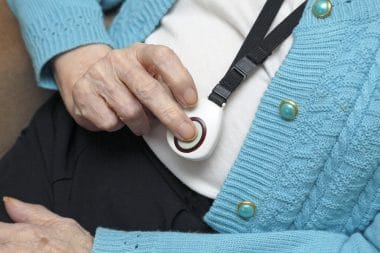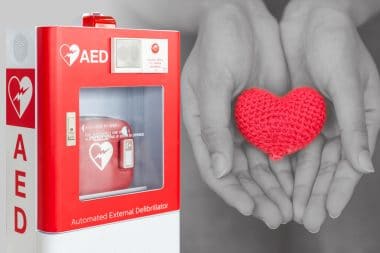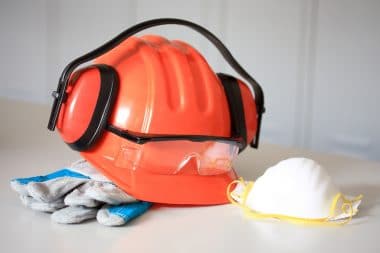The Alzheimer symptoms start slow, going from normal outward behavior up to advanced stages of decline. Each step has its own challenges for both the patient and family. According to a study conducted by the Washington University of St. Louis, elderly individuals with dementia presented higher levels of amyloid beta plaques in their brains. The higher deposit of amyloid beta is associated with mobility decline, contributing to a higher risk of patients losing balance and falling.
Alteration of executive functions is a challenge for seniors who lead an independent life. Some patients and families relate tough moments when a senior is alone at home and has a fall with injuries. In most cases, it can take up hours until someone arrives at home and asks for help. An alert medical system can help the patient request for assistance faster with just the press of a button. The SOS call will connect to a monitoring agent who can call for an emergency immediately.
Other advanced systems also detect a fall and call automatically to the alarming medical center. This type of systems includes sensors that can detect any changes in the patient’s balance, and it does not require the person to be aware enough to press the SOS button.
Systems with an automated fall alert are the best option in advanced cases of Alzheimer when the patient tends to suffer more significant cognitive impairment. Also, this is an excellent solution for cases where the patient loses consciousness after falling.
Wandering Lost Issues
Wandering is a risk for anyone who has a memory problem and is able to walk, even during the early stages of dementia. Your loved ones might not recognize familiar faces anymore, mistake a person for someone else, have delusions and completely forget where he is. The disorientation can get so bad that the patient won’t even be able to find help.
This is when GPS can assist families and patients. According to the Alzheimer’s Association, six out of 10 people with dementia will wander, but if you have a GPS beamed to a monitoring center, chances are you will be able to rescue your loved one faster. Good Samaritans passing by can also help, through the SOS button. It connects directly to the monitoring center and can help the senior getting back home.
Even if you have a caregiver at the house or take care of the patient yourself, wandering can occur, and you need to be prepared on how to deal with this. A medical alert system can help, and you can also adopt some extra actions to prevent wandering, as creating a stable routine, ensuring all basic needs are met, avoid busy places that can confuse or cause disorientation, and install additional devices that signal when a door is open.
Aggressive Patients
The progression of Alzheimer can also bring behavioral changes, such as an increase of agitation, abnormally suspicious and aggressiveness. It can be hard for the caregiver or familiar to handle this situation, but a medical alert system can summon extra help with the press of a button. Taking care of an elderly with dementia is often overwhelming, and a system like this can provide some peace of mind.
Depending on the disease stage, the person may be unable to recognize or tell what they are in need, and how to achieve it. This can cause a challenging or aggressive response. According to the UK Alzheimer Association, it will take some measurements to understand what’s wrong and how to solve the issue. The demands can be either physical, psychological or social, such as feeling lonely or bored.
How Does A Medical Alert System Work
The system consists of a base station, the emergency button and the monitoring center.
The base station can be connected by landline phone, wireless cell phone or VOIP services. It is equipped with a loudspeaker and a highly sensitive microphone.
It is important to remind the emergency button usually comes as a necklace or bracelet, which operates as an emergency wireless transmitter. This transmitter needs to have a battery to work, so the patient or the caregiver should keep an eye on its life span.
The monitoring center works 24/7, where trained emergency responders will be able to make an assessment over the situation and send alerts to loved ones or High-related services like hospital and ambulances.
Having a medical alert system is very reassuring for patients and family. According to HomeSecurityHeroes, their Life Alert systems can help prevent a catastrophe from occurring every 11 minutes. This shows how much risk can be avoided with a reliable solution like this. So, whenever the emergency happens, you know your loved one will receive immediate assistance. Dementia can be a severe disease to endure, but you and your family do not need to hold this alone. A medical alert system can provide unobtrusive monitoring, allowing independence, freedom, and privacy at your own home. Avoid retirement homes and ensure a better quality of life to your beloved ones.
Extra Sources https://www.dementiacarecentral.com/medical-alert/alzheimers https://www.webmd.com/alzheimers/news/20110718/falls-an-early-clue-to-alzheimers https://www.alz.org/alzheimers-dementia/what-is-alzheimers https://www.alz.org/media/Documents/facts-and-figures-2018-r.pdf








Reply